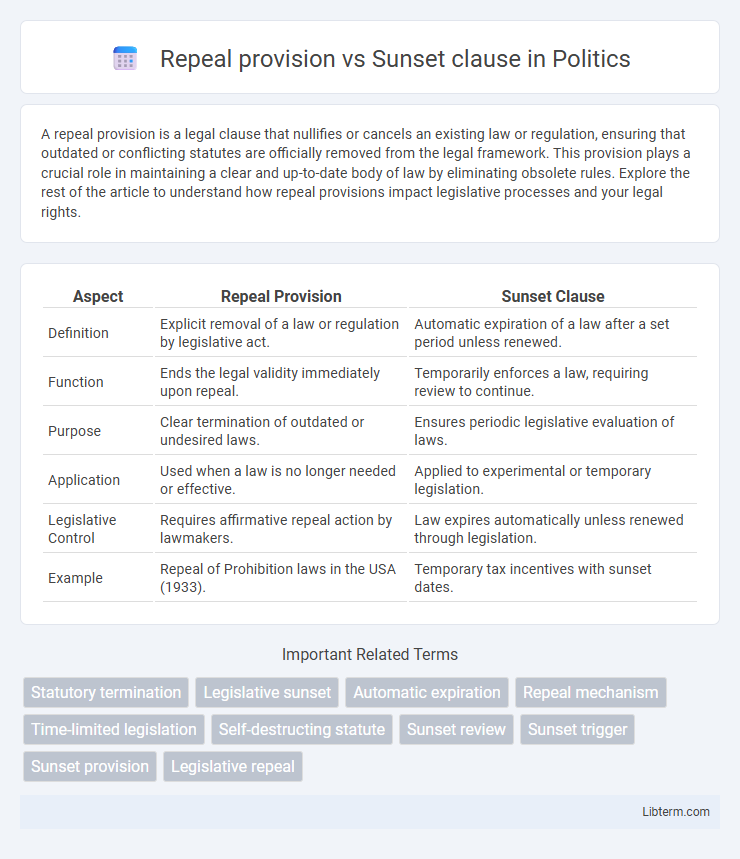A repeal provision is a legal clause that nullifies or cancels an existing law or regulation, ensuring that outdated or conflicting statutes are officially removed from the legal framework. This provision plays a crucial role in maintaining a clear and up-to-date body of law by eliminating obsolete rules. Explore the rest of the article to understand how repeal provisions impact legislative processes and your legal rights.
Table of Comparison
| Aspect | Repeal Provision | Sunset Clause |
|---|---|---|
| Definition | Explicit removal of a law or regulation by legislative act. | Automatic expiration of a law after a set period unless renewed. |
| Function | Ends the legal validity immediately upon repeal. | Temporarily enforces a law, requiring review to continue. |
| Purpose | Clear termination of outdated or undesired laws. | Ensures periodic legislative evaluation of laws. |
| Application | Used when a law is no longer needed or effective. | Applied to experimental or temporary legislation. |
| Legislative Control | Requires affirmative repeal action by lawmakers. | Law expires automatically unless renewed through legislation. |
| Example | Repeal of Prohibition laws in the USA (1933). | Temporary tax incentives with sunset dates. |
Understanding Repeal Provisions and Sunset Clauses
Repeal provisions explicitly terminate a law or regulation, rendering it null and void from a specified date, ensuring clear legal cessation. Sunset clauses, embedded within statutes, automatically expire the law after a predetermined period unless renewed or extended by legislative action. Both mechanisms provide temporal control over legislation, but repeal provisions require active intervention, whereas sunset clauses enforce automatic expiration.
Key Differences Between Repeal Provisions and Sunset Clauses
Repeal provisions permanently remove a law or statute from the legal system, ensuring it no longer applies or has effect, whereas sunset clauses set a predetermined expiration date for legislation unless renewed by further legislative action. Repeal provisions are typically used for laws considered obsolete or harmful, whereas sunset clauses provide a built-in review mechanism to assess a law's continued relevance and effectiveness over time. The key difference lies in permanence: repeal provisions eliminate laws indefinitely, while sunset clauses create temporary laws subject to renewal or expiration.
Legal Definitions and Interpretations
Repeal provisions explicitly terminate an existing law or statute, removing its legal force and effect permanently or until a new law replaces it, and are often used to correct or update legislation. Sunset clauses automatically nullify a law or specific statutory provisions after a predetermined period unless legislative action renews them, providing a built-in expiration mechanism that encourages periodic review. Courts interpret repeal provisions as definitive legal endpoints, whereas sunset clauses require continuous legislative oversight, reflecting distinct legislative intent and statutory interpretation principles.
Historical Context and Evolution
The repeal provision emerged in legislative frameworks to allow explicit termination or removal of outdated laws, tracing back to early legal systems where adaptability was crucial for governance. The sunset clause developed in the 20th century as a built-in expiry mechanism forcing periodic review and renewal of statutes, reflecting modern demands for regulatory oversight and accountability. Together, these legal tools illustrate the evolution from static codifications to dynamic lawmaking responsive to societal and political changes.
Purposes and Objectives in Legislation
Repeal provisions serve the purpose of permanently removing a law or specific sections of legislation to eliminate outdated or redundant legal requirements. Sunset clauses aim to achieve regulatory efficiency by imposing predetermined expiration dates on laws unless actively renewed, ensuring periodic review and adjustment. Both mechanisms promote legal clarity and adaptability, with repeal provisions focusing on definitive cessation and sunset clauses emphasizing controlled legislative lifespan and accountability.
Advantages of Repeal Provisions
Repeal provisions offer legal clarity and certainty by explicitly removing outdated or superseded laws, preventing confusion in statutory interpretation. They enhance legislative efficiency by ensuring that only relevant and current laws remain enforceable, reducing administrative burden. This direct approach to law termination supports better legal compliance and streamlined governance.
Benefits of Sunset Clauses
Sunset clauses offer clear benefits by automatically terminating laws or regulations after a predetermined period, which promotes legislative efficiency and adaptability. These clauses encourage periodic review and evaluation, helping lawmakers eliminate outdated or ineffective provisions while ensuring that only necessary laws remain in force. This mechanism reduces the risk of legal stagnation and enhances accountability by requiring active decisions to renew or revise existing statutes.
Common Applications in Lawmaking
Repeal provisions are legislative tools used to explicitly revoke or annul existing laws, commonly applied to remove outdated statutes or correct legal inconsistencies. Sunset clauses automatically terminate a law or regulation after a predetermined period unless renewed, frequently employed in regulatory frameworks and temporary fiscal measures to ensure periodic review. Both mechanisms facilitate lawmaking adaptability by enabling lawmakers to manage legislative lifespans and maintain relevant, effective legal codes.
Challenges and Criticisms
The repeal provision faces challenges in ensuring timely legislative updates, as its effectiveness depends on proactive government action, which can be inconsistent, leading to outdated or redundant laws remaining in force. Sunset clauses often encounter criticism for creating legal uncertainty, as they require periodic renewals that may delay important regulatory measures or cause temporary lapses in law enforcement. Both mechanisms struggle with political resistance and administrative burdens that can hinder their intended function of maintaining a streamlined and relevant legal code.
Choosing the Right Mechanism: Repeal Provision or Sunset Clause
Choosing between a repeal provision and a sunset clause depends on legislative objectives and control preferences. A repeal provision allows for explicit termination by legislative action, offering flexibility and deliberate policy review, while a sunset clause automatically terminates the law after a set period unless renewed, ensuring periodic reassessment. Understanding the implications of each mechanism is crucial for maintaining legislative accountability and adapting to changing legal or social conditions.
Repeal provision Infographic

 libterm.com
libterm.com